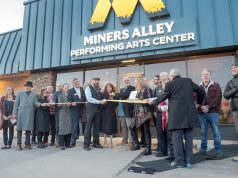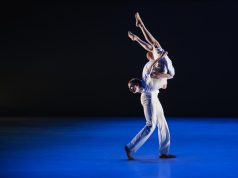
How many times have you been to the theatre during the past year? Granted, you’re reading a theatre review, so you’re probably pretty far down the right hand side of the Bell Curve, but be honest. Did you go once? Twice? In my experience, even self-proclaimed theatre lovers only see a few shows per year. The rest of the populace, though many will quickly state that they really enjoy theatre and wish they attended more shows, probably don’t even make it to one performance every 12 months.
Worse yet, when people do elect to take in some theatre, it’s almost always something safe, something popular. Why else would Cats enjoy its decades of successful runs while Vampire Lesbians of Sodom hardly ever gets produced? It’s all about putting asses in the seats, and mainstream theatre brings people in, while experimental theatre, more often than not, scares them away. In theatre, as in so many other aspects of life, people fear the unknown.
Despite its size and relatively robust theatre scene, for the past decade or so, Denver has been home to only one or two resident, experimental theatre companies. The most well-known is The LIDA Project. From its warehouse space on the edge of downtown, LIDA has produced some amazing theatre over the years. After a brief sojourn away from the Mile High City, LIDA is back and not a minute too soon. While there’s nothing wrong with bubbly musical theatre originally scripted in the 1940s or wacky improv comedy, audiences need to be challenged, and artists need a venue in which they can stretch themselves not only as actors but as collaborators in the creation of new and unique works.
I couldn’t be happier that The LIDA Project is back in town. That said, LIDA’s latest, Roller Skating With My Cousin, is not the barnstormer I’d hoped it would be. This non-plot-driven, non-linear, experiential production is at once a paean to and an indictment of America in the 1980s. It posits Ronald Reagan as the anti-Christ, John Hinckley as a savior of sorts and God as a tighty-whities-and-gas-maskwearing madman. Not content to merely fictionalize the former president and his would-be assassin; the show also touches on particle physics, astronomy and the Tower of Babel. And, of course, there is much roller skating thrown in for good measure. (The roller skaters, who all skate admirably, at one point kinetically represent the Large Hadron Collider, a decidedly non-80s bit of scientific engineering.)
Roller Skating With My Cousin is neither awful nor astounding. It contains some inspired moments, including the use of two floating projection screens. It also lags at times, which brings its periodic momentum to an unwelcome halt. For a piece of experimental theatre, it also presents as extremely predictable in certain ways. We know there will be roller skating, and as it is set in the ’80s, bad fashion and big hair are to be expected, but do we really need Survivor’s “Eye of the Tiger” played over the thumb-wrestling match between Reagan and what appears to be a high school wrestling coach? Are the fall of the Berlin Wall and the space shuttle Challenger disaster the only compelling ’80s references available? And isn’t there some equally representative but decidedly more interesting musical choice than Journey’s “Don’t Stop Believing?” Wherefore art thou, “Come On Eileen?”
Having lived through the ’80s, I had personal experience with all the characters and references in Roller Skating With My Cousin. I wonder, though, how a teenager or 20-something who never wore parachute pants or listened to Thriller on vinyl would relate to this play. Without knowing firsthand of Hinckley’s obsession with Jodi Foster or of Iran-Contra or what “couples skate” means, it feels like one would have to be an ’80s historian of some distinction to even begin to comprehend the vast majority of the action on stage.
By no means a failure but far from a triumph, Roller Skating With My Cousin is undeniably challenging, and that is a victory in and of itself. I look forward to whatever The LIDA Project brings forth next.














